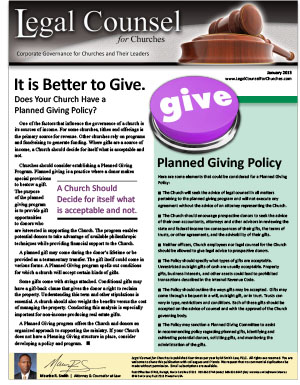Sooner or later, most churches will find themselves with a need to hire an attorney. The situation may arise from a routine transaction or a dispute. No matter how the situation comes about, the risk of mishandling a legal question can be costly. For this reason, choosing the most appropriate legal counsel becomes an important decision.
When circumstances become serious enough for an attorney to be involved, there are usually substantial rights and/or money at stake. For this reason, having the right attorney on the case becomes increasing important. In this article, we explain some of the factors church leaders should consider when selecting a church lawyer.
Church leaders should understand that no lawyer knows everything about every law. Like many professionals, lawyers often specialize in particular legal practices. Some attorneys concentrate on criminal defense. Some have a practice of family law. Other law firms only accept clients for business matters.
When shopping for legal services, church leaders should look for an attorney who practices in that area of the law. While this is a practical point for a church client, this point reinforces a legal duty all lawyers owe to a client. The North Carolina Bar requires lawyers to provide competent representation to clients. If a lawyer is unfamiliar with an area of law, he/she should give notice to the client so that the client may make an informed decision concerning hiring the lawyer.
After church leaders select an attorney, it should be clear to all how the engagement is to be managed. One of the first points to discuss is the fee arrangement. Some attorneys bill clients by the hour. The hourly rate varies depending on the going rate in an area, the lawyer’s skills and the nature of the transaction. In some instances, the fee is a turnkey price for the entire work assignment.
A church lawyer should clearly understand the client’s objectives. While it might seem intuitive that a client only wants a problem- free business deal or to win a debate, a good result may be more complicated than that. An attorney should work to understand any ancillary issues that may be addressed. These secondary issues for a church may include healing relationships among the congregation, protecting its reputation in the community and following biblical values.
Finally, church leaders should question a prospective lawyer on how communications will be handled. The most often cited complaint clients have of lawyers involves a lack of communication. Clients occasionally state that their lawyers do not keep them informed on the progress of their cases. Church leaders are well advised to establish an expectation of what communication they desire. An understanding should be reached on the frequency of updates and manner of communication (email, US Postal, telephone, or in-person).
Hiring a lawyer is a task most churches will eventually undergo. Approaching the hiring process in an informed manner will help the relationship proceed smoothly.

